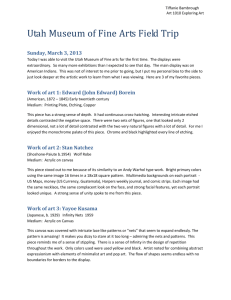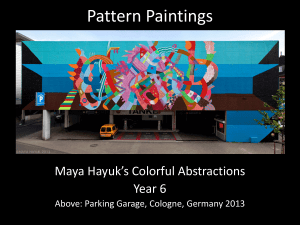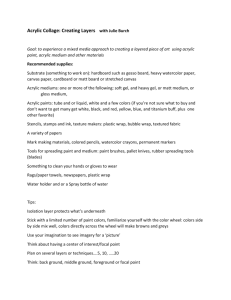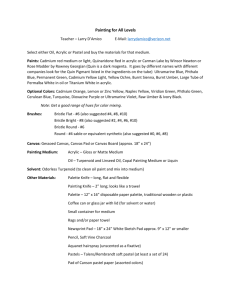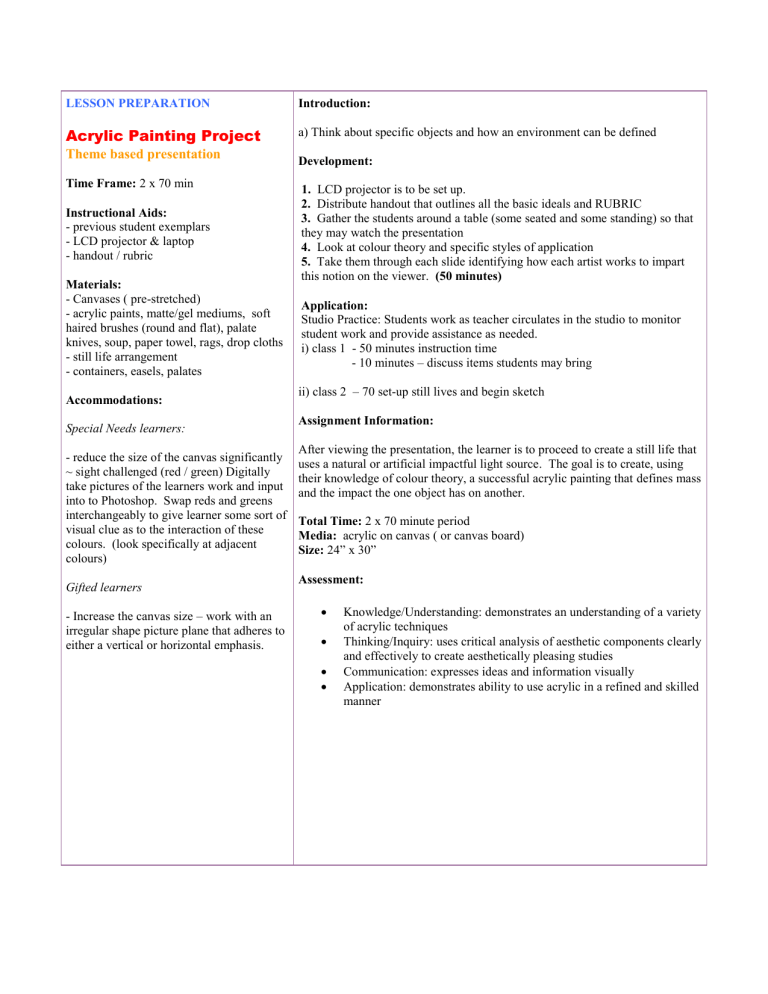
LESSON PREPARATION Introduction: Acrylic Painting Project a) Think about specific objects and how an environment can be defined Theme based presentation Development: Time Frame: 2 x 70 min Instructional Aids: - previous student exemplars - LCD projector & laptop - handout / rubric Materials: - Canvases ( pre-stretched) - acrylic paints, matte/gel mediums, soft haired brushes (round and flat), palate knives, soup, paper towel, rags, drop cloths - still life arrangement - containers, easels, palates Accommodations: Special Needs learners: - reduce the size of the canvas significantly ~ sight challenged (red / green) Digitally take pictures of the learners work and input into to Photoshop. Swap reds and greens interchangeably to give learner some sort of visual clue as to the interaction of these colours. (look specifically at adjacent colours) Gifted learners - Increase the canvas size – work with an irregular shape picture plane that adheres to either a vertical or horizontal emphasis. 1. LCD projector is to be set up. 2. Distribute handout that outlines all the basic ideals and RUBRIC 3. Gather the students around a table (some seated and some standing) so that they may watch the presentation 4. Look at colour theory and specific styles of application 5. Take them through each slide identifying how each artist works to impart this notion on the viewer. (50 minutes) Application: Studio Practice: Students work as teacher circulates in the studio to monitor student work and provide assistance as needed. i) class 1 - 50 minutes instruction time - 10 minutes – discuss items students may bring ii) class 2 – 70 set-up still lives and begin sketch Assignment Information: After viewing the presentation, the learner is to proceed to create a still life that uses a natural or artificial impactful light source. The goal is to create, using their knowledge of colour theory, a successful acrylic painting that defines mass and the impact the one object has on another. Total Time: 2 x 70 minute period Media: acrylic on canvas ( or canvas board) Size: 24” x 30” Assessment: Knowledge/Understanding: demonstrates an understanding of a variety of acrylic techniques Thinking/Inquiry: uses critical analysis of aesthetic components clearly and effectively to create aesthetically pleasing studies Communication: expresses ideas and information visually Application: demonstrates ability to use acrylic in a refined and skilled manner LESSON PREPARATION Introduction: Acrylic Painting Project a) presentation on techniques (show and speak on the capabilities of the medium) b)Acrylic materials demo Materials and techniques based presentation Time Frame: 1 x 70 min Instructional Aids: - LCD projector & laptop Materials: - Canvases ( pre-stretched) - acrylic paints, matte/gel mediums, soft haired brushes (round and flat), palate knives, soup, paper towel, rags, drop cloths - pictorial references - containers, easels, palates Accommodations: Special Needs learners: Development: 1. LCD projector is to be set up. a) take the learners through the presentation outlining all the various applications of the medium b) Look at both the transparent and opaque applications 2. DEMO – start by showing the learners all the tools – show them the types of brushes available (outline the benefits and drawbacks) 3. Specialty tools should outlined separately in terms of how they impact the canvas 4. Demonstrate the impact of pigment to binder ratios – how does this affect price and quality. (40 minutes) Application: Studio Practice: Students work as teacher circulates in the studio to monitor student work and provide assistance as needed. i) class 1 - 40 minutes instruction time - 20 minutes working time - reduce the size of the canvas significantly ~ sight challenged (red / green) Digitally take pictures of the learners work and input into to Photoshop. Swap reds and greens interchangeably to give learner some sort of visual clue as to the interaction of these colours. (look specifically at adjacent colours) Assignment Information: Gifted learners Assessment: - Increase the canvas size – work with an irregular shape picture plane that adheres to either a vertical or horizontal emphasis. After the demo and presentation, the learners are to utilize the remaining time to work on their planning and preparation of their finished canvas. Total Time: 1 x 70 minute period Media: acrylic on canvas Size: 24” x 30” Knowledge/Understanding: demonstrates an understanding of a variety of acrylic techniques Thinking/Inquiry: uses critical analysis of aesthetic components clearly and effectively to create aesthetically pleasing studies Communication: expresses ideas and information visually Application: demonstrates ability to use acrylic in a refined and skilled manner
